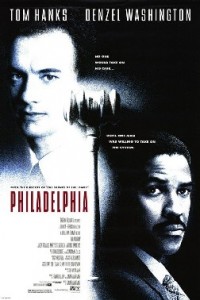 A few weeks ago I wrote about two groundbreaking 1967 films starring Sidney Poitier in which Poitier portrays a black man who insists upon sharing equal ground with the white people who inhabit his world. In that review I said that while I did not consider either of the movies or Poitier’s acting to be outstanding, I believed that the three were true cultural icons with enduring relevance. At the end of the article I wondered if Philadelphia might also be such an icon.
A few weeks ago I wrote about two groundbreaking 1967 films starring Sidney Poitier in which Poitier portrays a black man who insists upon sharing equal ground with the white people who inhabit his world. In that review I said that while I did not consider either of the movies or Poitier’s acting to be outstanding, I believed that the three were true cultural icons with enduring relevance. At the end of the article I wondered if Philadelphia might also be such an icon.
Well, the other day I watched Philadelphia again.
Andrew Beckett (Tom Hanks) is a bright young lawyer with a future in one of the top law firms in Philadelphia. The firm’s partners have just given him a very delicate and important case to handle, a case which will be the making of his career.
Andrew is also gay. And he has AIDS: the KS lesions are beginning to show and Andrew is getting sicker. One day when he is receiving hospital treatment for an AIDS-related episode, he learns that a time-sensitive document vital to the case has suddenly and mysteriously gone missing. At the last possible moment the document is located in the completed cases file. Andrew is fired, ostensibly for incompetence.
Convinced that he has been wrongfully dismissed, Beckett seeks a lawyer who is willing to represent a gay man with full-blown AIDS in a suit against a powerful law firm. After he is turned down by everyone he has approached, his last hope is Joe Miller (Denzel Washington), an ambulance chasing independent attorney who happens to be both black and decidedly homophobic. Miller refuses to take the case, leaving Andrew with no choice but to represent himself. He proceeds to prepare his case while dealing with the increasingly debilitating effects of the disease.
One evening, Beckett, clearly very ill, is working at a table in the public library; the librarian approaches him and rather unsubtly suggests that Andrew might be more comfortable in a private research room. The other people at the table quickly catch his drift and just as quickly begin moving away. Miller happens to be at a nearby table and observes this scenario; perhaps thinking that less than forty years earlier, he could have been sitting in Andrew’s chair, he approaches the young lawyer and agrees to take the case.
The rest of the film sees Miller slowly ratcheting down his homophobia (although it is clear that he never loses it entirely) as he comes to know Andrew as a human being who has suffered from blatant discrimination as well as from a disease that will soon end his life, but who still has the capacity to love and is very much loved by his partner, his family, and his coworkers.
The courtroom scenes are powerful and riveting; Miller is at turns shocking, tender, witty, and passionate as he argues Andrew’s case. The scenes of Andrew’s personal life and the struggle he is enduring are often deeply touching. And the film’s ending is satisfying.
Philadelphia was released in 1993. It was the first major Hollywood dramatic motion picture to feature openly gay characters and to portray them in a positive light. While there is very little physical contact in the film between Andrew and his partner Miguel (Antonio Banderas), the Spanish actor’s fine performance leaves no doubt that the love between these two gay men is as powerful as the love between Joe Miller and his beautiful wife.
The making of this movie was an act of great courage.
Yet if Mr. Hanks deserved to win the Academy Award for best actor for his performance as Andrew Beckett (and win he did), Sidney Poitier should have won it for In the Heat of the Night in 1967. Neither Hanks nor Denzel Washington is a great actor (like Poitier, they just don’t have much range), nor is Philadelphia a great film. But just as African Americans thanked Sidney Poitier and Norman Jewison for creating Virgil Tibbs, the first black man in cinema with dignity and courage and intelligence, so must we thank—Come on now, people—director Jonathan Demme (The Silence of the Lambs) and Mr. Hanks for doing the same with Andrew Beckett.
Will Philadelphia endure? Perhaps it is still too early to tell. But after twenty years and several viewings, the movie still moved me. I’ll check in again in another twenty years.
Image Credits
Philadelphia Movie Poster @ Wikipedia
Recent Ross Lonergan Articles:
- The Film-School Student Who Never Graduates: A Profile of Ang Lee, Part Four
- The Film-School Student Who Never Graduates: A Profile of Ang Lee, Part Three
- The Film-School Student Who Never Graduates: A Profile of Ang Lee, Part Two
- The Film-School Student Who Never Graduates: A Profile of Ang Lee, Part One
- Bullying, Fear, And The Full Moon (Part Four)


Please Share Your Thoughts - Leave A Comment!